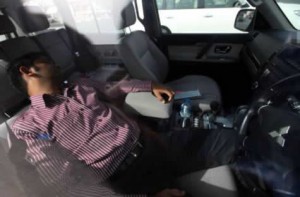Motoring Offence Guidance
General practice lawyers who deal with all areas of criminal law won’t always know the intricate legal arguments that can be put forward on your behalf if you have been accused of any of the motoring offences below;
Failing to name the driver
Section 172 information requests are sent to registered keepers of vehicles following a motoring offence.
If you do not complete and return the form you will be liable for 6 points.
There are two statutory defences, S172(4) and S172(7)(b) Road Traffic Act 1988.
To establish the identity of the driver at the time of offence, you will have to demonstrate in court that you used reasonable diligence, or that you didn’t receive the S172 driver identity request at all.
Having No Insurance
If stopped driving without car insurance, you are considered to be at fault and therefore guilty, regardless of your excuse.
Pleading guilty to driving without valid motor insurance, or being convicted of the offence will earn you six to eight penalty points on your driving licence.
Sometimes an insurance policy will have been cancelled without the driver being notified.
If you can show you genuinely and honestly believed you had valid motor insurance, you can use a Special Reasons Argument.
Speeding
The penalty for speeding is three – six points, a driving ban if warranted by your offence, costs as well as a fine.
Without having expert testimony in your defence it is becoming increasingly complicated to contest these allegations.
Drinking and Driving Offences
The drinking and driving limit in the UK is 35mg in breath. You will be banned from driving for a minimum of 1 year if convicted of drinking and driving.
To win in Magistrates court, defending your drink drive allegation, you have three legal defences; you were not the driver at the time of the offence, you were not in a public place, or you didn’t drink until after you had driven, rather than before.
It’s also possible to avoid a disqualification if you can demonstrate you unknowingly consumed alcohol that took you beyond the permitted limit, you only drove a very short distance or you had to drive for a real life emergency situation.
Drunk in Charge
To gain a conviction, it is necessary for the prosecution to show that you were over the legal drink drive limit and that you were in charge of the car at the time of the offence.
You have a possible defence if you can demonstrate you were not intending to drive until you were under the drink drive limit.
The penalty for drunk in charge of a vehicle is either ten points or a discretionary driving ban.
Mobile Phone Offences
You need to be holding the mobile while you are using it in order to commit an offence.
Many Magistrates view mobile phone use while driving differently.
Stopping in a traffic jam, roadwork’s or at traffic signals is still classed as driving, and it is still an offence to use a mobile. Many Magistrates and Courts don’t understand the finer points of mobile phone driving law, neither do many arresting police officers. Find out if you can defend your ‘mobile phone driving offence allegation‘ by asking leading UK motoring solicitors Patterson law a free, no obligation question about your offence.
Without Due Care Road Traffic Offences
To be convicted of driving without due care and attention, it is necessary for the prosecution to prove beyond any reasonable doubt that the standard of your driving was not that of a competent and careful driver.
Motorway motoring offences such as undertaking are examples of driving without due care.
Many drivers receive an offer from the police to attend a Driving Improvement Course rather than having to attend court and facing prosecution for the offence.
Fail to Stop
Any driver involved in an accident has a legal obligation to stop and provide your details in accordance with S 170 Road Traffic Act 1988 if either; property, another vehicle or a person was damaged or injured.
If it wasn’t possible to exchange details with the other party at the time of the accident, you have up to 24 hours in which to report the accident to the police.
Failure to Report/Stop carries five – ten driving licence penalty points or a driving ban at the Magistrates discretion.
One defence is that you didn’t know that you’d had an accident and caused damage. If you can show that it would be reasonable not to know then you have a valid defence against the allegations.
The maximum punishment for failing to report and failing to stop is a prison sentence, but community service is also a possibility.
Dangerous Driving
To gain a conviction against you, the prosecution needs to demonstrate that at the time of the offence, your driving standard fell far below that required, and also that it was clearly obvious to any competent driver that at the time, your driving was dangerous.
The minimum penalty for dangerous driving is a 12 month driving licence disqualification, including an extended re-test as well as a potential custodial sentence.
Driving With No Licence
This motoring offence is often misunderstood by drivers.
If you were stopped driving without having L plates on display, or having never passed a driving test, then these would be endorsable offences.
If the DVLA requested you to return your driving licence to them and they suspend your driving entitlement, the offence is non-endorsable.
A common misconception is that no licence means that your car insurance policy is invalid. That is not true.
The Police are often wrong on the issue as to whether this driving offence carries penalty points – so get expert guidance if you are charged with this motoring offence.


